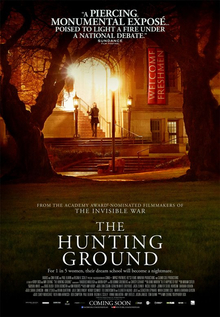| The Hunting Ground | |
|---|---|
 Theatrical release poster | |
| Directed by | Kirby Dick |
| Written by | Kirby Dick |
| Produced by | Amy Ziering |
| Cinematography | Aaron Kopp Thaddeus Wadleigh |
| Edited by | Douglas Blush Derek Boonstra Kim Roberts |
| Music by | Miriam Cutler |
| Distributed by | RADiUS-TWC |
Release dates |
|
Running time | 103 minutes |
| Country | United States |
| Language | English |
| Box office | $405,917 [1] |
The Hunting Ground is a 2015 American documentary film about the incidence of sexual assault on college campuses in the United States and the reported failure of college administrations to deal with it adequately. Written and directed by Kirby Dick and produced by Amy Ziering, it premiered at the 2015 Sundance Film Festival. The film was released on February 27, 2015, [2] an edited version aired on CNN on November 22, 2015, [3] [4] and was released on DVD the week of December 1, 2015. [5] It was released on Netflix in March 2016. [6] Lady Gaga recorded an original song, "Til It Happens to You," for the film, which was nominated for the Academy Award for Best Original Song. [7]
Contents
- Background
- Content
- Soundtrack
- Reception
- Critical
- Accolades
- Political
- Responses by film subjects
- Awards and nominations
- See also
- References
- External links
The documentary focuses on Annie E. Clark and Andrea Pino, [8] two former University of North Carolina at Chapel Hill students who filed a Title IX complaint against UNC in response to their rapes while enrolled. [9] The use of Title IX in campus sexual assault cases became a model for universities across the country. [10] [11]
Critics of the film, including writer Emily Yoffe and several Harvard Law School professors, have questioned The Hunting Ground's accuracy and objectivity (Harvard was one of the institutions criticized for minimizing the issue of sexual assault and protecting an alleged perpetrator). [12] [13] [14] Among the issues raised by critics are the film's portrayal of one man as a rapist, while not disclosing that the university and its police had found him not responsible for the alleged sexual assault [12] [13] and for the use of controversial statistics. [15] The filmmakers have defended the film. [4] [16] [17] [18]